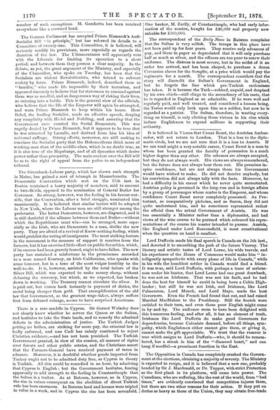The German Parliament has accepted Prince Bismarck's Anti- Socialist Bill
6. in principle," but has referred its details to a Committee of twenty-one. This Committee, it is believed, will seriously modify its provisions, more especially as regards the duration of the law. The Ultramontanes will apparently vote with the Liberals for limiting its operation to a short period, and between them they possess a clear majority. In the debate, as yet, the great argument of the Ministry, and especially of the Chancellor, who spoke on Tuesday, has been that the Socialists are violent Revolutionists, who intend to subvert society by force. Prince Bismarck, indeed, described them as "bandits," who made life impossible by their terrorism, and appeared sincerely to believe that for statesmen to contend against them was as needful, and as dangerous a way of risking their lives, as entering into a battle. This is the general view of the officials, who believe that the life of the Emperor will again be attempted, and warn Prince Bismarck to keep within his house. Herr Bebel, the leading Socialist, made an effective speech, denying any complicity with Hridel and Nobiling, and asserting that the Government once courted the Social Democrats. This was angrily denied by Prince Bismarck, but it appears to be true that he was attracted by Lassalle, and derived from him his idea of universal suffrage. Strong efforts, moreover, are still making to convince the Socialist party that the Hohenzollerns think more of working-men than of the middle-class, which is no doubt true, as it is also true of the Hapsburgs, and of all dynasties which desire power rather than prosperity. The main contest over the Bill will be as to the right of appeal from the police to an independent tribunal.






























 Previous page
Previous page